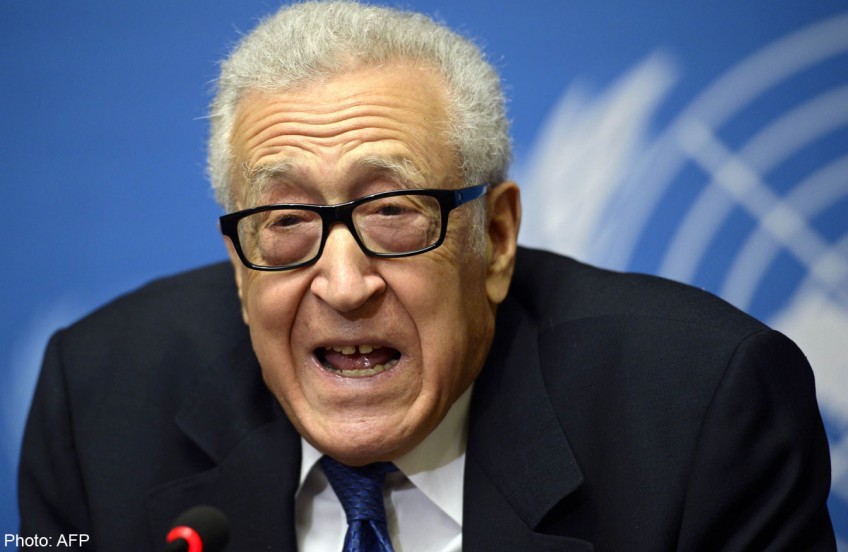UN 'very sorry' as Syria talks break off in failure

GENEVA - The UN's Syria envoy said he was "very, very sorry" Saturday after Geneva peace talks broke off without result, throwing the future of the negotiations to end the bloody conflict into doubt.
Just weeks after the warring parties sat down for the first time to seek a political settlement to the three-year conflict, a second round ended in acrimony.
"I'm very, very sorry," UN mediator Lakhdar Brahimi told reporters in Geneva as he announced the break-off in talks, with no date set for a third round.
"I think it is better that every side goes back and reflects, and takes their responsibility: do they want this process to continue or not?"
Britain's Foreign Secretary William Hague decried the situation as "a serious setback in the search for peace in Syria."
With no guarantee the parties will return to the negotiating table, the death toll continued to mount in Syria where more than 140,000 have died and millions have been driven from their homes.
A monitoring group said this week more than 5,000 people had been killed since the talks began on January 22.
And the UN raised the alarm over Syrian air raids in the Qalamun mountains near the Lebanese border, as thousands fled the opposition-held town of Yabrud amid fears of a ground assault.
In Geneva, the rivals seemed to agree on only one thing this week: the negotiations were going nowhere.
"The regime is not serious... There is nothing positive we can take from this," opposition spokesman Louay Safi told reporters after the talks.
The head of the regime's negotiating team Bashar Jaafari described the other side as "amateurs", blaming the opposition's backer the United States for "trying its best to undermine the whole process."
Third round possible
Brahimi noted that the two sides had at least finally agreed on an agenda for possible future talks.
"I very much hope there will be a third round," Brahimi said. The opposition says the focus must be on creating a transitional government, without President Bashar al-Assad.
The regime representatives have insisted Assad's position is non-negotiable and refused to discuss anything beyond the "terrorism" it blames on its opponents and their foreign backers.
Brahimi said if the sides returned, they would discuss violence and terrorism first, then the transitional governing body (TGB), followed by national institutions and finally national reconciliation and national debate.
However, he said the regime side baulked at his suggestion they spend one day on violence and the next on political transition, "which raises the suspicion of the opposition that the government doesn't want to discuss TGB at all."
Safi of the opposition confirmed that suspicion, insisting "a third round without talking about transition would be a waste of time.
Jaafari denied his delegation had blocked the process, accusing the opposition of "misleading public opinion" and insisting that the regime "will be back." But Brahimi said a break in the talks was needed, calling on the government side to give reassurances it would seriously discuss the political transition issue.
The parties had agreed an agenda, but "we also have to agree on how we tackle that agenda" to avoid falling into "the same traps that we have been struggling with this week," he said.
Frustration in Washington
The veteran peacemaker said he would soon travel to New York to report to UN Secretary General Ban Ki-moon, and would be in touch with the two Syrian delegations.
Brahimi said the situation would also be discussed with the United States and Russia, a key ally of Damascus, "hopefully" through meetings with US Secretary of State John Kerry and Russian Foreign Minister Sergei Lavrov.
Washington has voiced deep frustration at the stalemate and chastised Moscow, its co-sponsor of the so-called Geneva II talks, for not doin g enough to push its ally to engage "seriously" in the process.
The opposition's Safi also urged Moscow to use pressure Damascus to stop "stalling". US President Barack Obama vowed Friday to push the regime harder.
"There will be some intermediate steps that we can take to apply more pressure to the Assad regime," he said without specifying what such steps might be. French Foreign Minister Laurent Fabius also blamed the failure of the talks squarely on Damascus.
The regime "blocked any progress on establishing a transition government and stepped up violence and acts of terror against the civilian population," Fabius said. Britain's Hague said the impasse showed the urgency of adopting a new UN Security Council resolution on Syria.
The evacuation of civilians from besieged rebel-held areas of Homs - seen as the talks' only tangible result so far - has been hailed as a relative success.
The Red Cross however voiced alarm Saturday at the chaotic circumstances of the evacuation amid continued shelling and aid convoys coming under attack, while the UN has said more than 250,000 Syrians remain stuck in besieged communities.
Nonetheless, Brahimi said even the modest achievements in Homs may have sparked hope in Syria of an end to "this horrible crisis".
"I apologise to them that these two rounds have not helped them very much," he said.